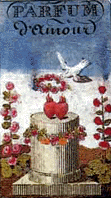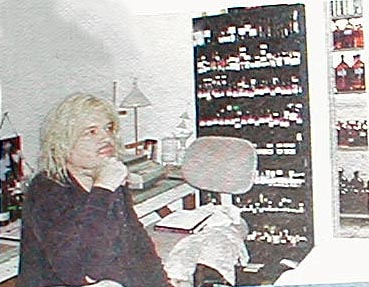Midgley makes fragrances
& debunks aromatherapy |
 Jonathon Midgley, 51, is a perfumerer, a maker of fragrances. Some
of the more unusual scents his clients have requested are those of
breast milk, blood, freshly ground coffee, fragrances of the three stages
of womanhood, invitations to "liasonous" occasions and melaleuca swamp.
Jonathon Midgley, 51, is a perfumerer, a maker of fragrances. Some
of the more unusual scents his clients have requested are those of
breast milk, blood, freshly ground coffee, fragrances of the three stages
of womanhood, invitations to "liasonous" occasions and melaleuca swamp.
Fragrances create intense memories and sensations, they stimulate the
olfactory epithelium or lining of the nose which stimulates a primitive
part of the "reptilian brain", the rhinencephalon which lies at the lower
end of brain stem where it meets the spinal chord. The primitive brain controls
involuntary reactions such breathing, heart beat, breathing and peristalsis.
This part of the brain can be easily stimulated by fragrances odours which
affect appetite, arousal, memory, heart rate and body temperature.
We can detect fragrances as low as a few parts per trillion and we can
recognise 10,000 different odours with our olfactory sense [a dog's may be
10 to 100 greater than this]. Jonathon Midgley spent 25 years developing
a 'nose' for fragrances from single oils and aromas to complex perfumes.
He markets these under the Damask name brand.
His laboratory in Brisbane has all the odours from rows of essential oils,
absolutes, fixatives, synthetic aromatics, crystalline powders, resins and
solids.
Jonathon was born in Auckland in 19502 and from an early age
was fascinated by herbs, magic and spices. His parents had been missionaries
in South America and originally he had similar ambitions including that
of bible translator.
At theological college in New Zealand in the early 1970's, he began to
experiment after reading recipes for incense and annointing oils in the Old
Testament book of Exodus.There is a belief that anyone who is not a high
priest would be cursed if they made them.
After gaining permission from church hierarchy to experiment he obtained
the essences he required to prepare the ritual oils and incence, from a
perfume manufacturer in Auckland.
From here he obtained frankincence and myrrh and was impressed with the
number of essences kept there. Jonathon was expelled from theological college
for, as he says "being a little too radical for them" His interest in perfumery
increased and he began making Egyptian myrrh perfume and selling it to a
Wellington shop.
Later he moved to Brisbane to look after his parents where he married
and decided to contnue making the myrrh perfume but then relised he could
not make a living this way and so moved into industrial perfumes.
Here he made fragrances for clients. He established his laboratory in
Australia and gained a reputation for making any perfume for any occasion
at any price.
In 1982 he created "Lyre" a fragrance for the Commonwealth Games. One
hundred specially hand-blown bottles were created and the first one was
presented to the Queen.
In 1993 he created "Nocturnal Revolution" a perfume for the Queensland
Art Gallery Surrealism Exhibition.
"A good perfume is like a painting for the nose...... its creation
like Lego"
-Jonathon Midgley |
A good fragrance has base notes or heavier oils and lighter notes for
the more floral fragrances.
He gets his inspirations from the world around him, sniffing people, trees
and far away places.
He has had great success in recreating fragrances for mangoes, strawberries
and passionfruit.
The strawberry scent is composed of minute amounts of 40 ingredients,
his magnolia has 34, a skin fragrance may have 300-400 parts to it. Each
odour is made up of single or myriad of chemical compounds For example pentyl
ethanoate [amyl acetate] is the odour of banana and ethyl-3-phenyl-glycidate
that of strawberries.
AROMATHERAPY
He is not convinced of the efficacy of aromatherapy because of its emphasis
on "natural" products. As far a the perfumer & chemist are concerned
there is no difference between "natural" oils and synthetic products. Aromatherapy
in the last 10-15 years has tried to polarise the industry between natural
and synthetic perfumery, he believes this distinction to be utter rubbish.
Synthetics prevent cruelty to animals and replace toxic natural products.
Musks, the perfumer's  fixatives, are extremely important and are now synthetically made.However
prior to this they were obtained by taunting animals in cages in North Africa
to produce the musk oil from their glands. All that is "natural" is not good
for us, we do not eat oleander or deadly nightshade, nor cassava [tapioca]
unless it were cooked.
fixatives, are extremely important and are now synthetically made.However
prior to this they were obtained by taunting animals in cages in North Africa
to produce the musk oil from their glands. All that is "natural" is not good
for us, we do not eat oleander or deadly nightshade, nor cassava [tapioca]
unless it were cooked.
Jonathon's fragrances conform to the IFRA standards [International Fragrance
Association] which excludes the use of toxics and some aromatic hydrocarbons.
This was borne out once when in a heat wave Jonathon created a cologne
for himself composed of bergamot oil and citrus aromas, he broke out in a
rash which was put down to the natural bergamot oil which is listed by IFRA
as phototoxic.
Damask Perfumery-Jonathon Midgley-23-A
Wagner Road; Clayfield-Brisbane-Queensland
AUSTRALIA-4011-61 7 3852 1306
E-mail
Jonathon's grandfather, Wilfred Midgley emmigrated to New Zealand with
his mother and father [John Midgley] from Todmorden, Yorkshire when he was
eleven years old some time in the early 1900's. Wilfred was an only child
as was Jonathon's father, Robert Charles Midgley.2
Thomas
Midgley-Chemist
Midgley of West
Yorkshire and Todmorden
PREVIOUS
HOME
Reference:
1. Wilkie, Meredith, Making Scents, The Sun-Herald Magazine 8th July 2001.
2. E-mail communication, Jonathon Midgley, June 2002.
Tim Midgley, July 2001, links revised July 2023.
 fixatives, are extremely important and are now synthetically made.However
prior to this they were obtained by taunting animals in cages in North Africa
to produce the musk oil from their glands. All that is "natural" is not good
for us, we do not eat oleander or deadly nightshade, nor cassava [tapioca]
unless it were cooked.
fixatives, are extremely important and are now synthetically made.However
prior to this they were obtained by taunting animals in cages in North Africa
to produce the musk oil from their glands. All that is "natural" is not good
for us, we do not eat oleander or deadly nightshade, nor cassava [tapioca]
unless it were cooked.  Jonathon Midgley, 51, is a perfumerer, a maker of fragrances. Some
of the more unusual scents his clients have requested are those of
breast milk, blood, freshly ground coffee, fragrances of the three stages
of womanhood, invitations to "liasonous" occasions and melaleuca swamp.
Jonathon Midgley, 51, is a perfumerer, a maker of fragrances. Some
of the more unusual scents his clients have requested are those of
breast milk, blood, freshly ground coffee, fragrances of the three stages
of womanhood, invitations to "liasonous" occasions and melaleuca swamp.